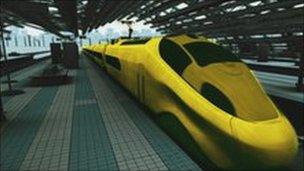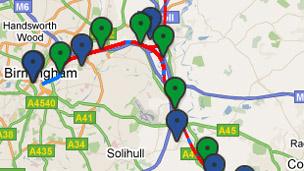MPs told high speed rail may widen north-south divide
- Published
- comments

The government wants to see 250mph trains linking London to Leeds and Manchester
For the government, high speed rail offers a once in a generation opportunity to end the north-south divide.
Many of the political leaders within the North agree.
But a report going before MPs, external is about to cast serious doubt on whether high speed rail is really going to reduce the imbalance between different parts of the country.
It's been put together, external by Newcastle University academic Professor John Tomaney, external.
Rebalancing the country
He's presenting it as part of his evidence to the Transport Select Committee, external of MPs. They are looking at the case for and against a new north-south high speed rail line, the so-called High Speed 2.
The government wants to build a high speed 250mph line from London to Birmingham initially, with separate spurs to Manchester and Leeds following on later.
Transport Secretary Philip Hammond, external believes it can play a major part in achieving the government's aim of rebalancing the country's economy away from its over-reliance on the South.
He has said: "(High speed rail represents) a once-in-a-generation chance to reshape our economic geography; bring our key cities closer together; regenerate our urban centres; and tackle the north-south divide that has held this country back for far too long."

Transport Secretary Philip Hammond believes high speed rail offers a "once-in-a-generation" opportunity
The implication being that regions like the North East and North West have more to gain from high speed rail than London and the South East.
But John Tomaney's report begs to differ.
It looks at the impact of high speed rail in other countries and concludes that there is little or no evidence that it will deliver what the government wants.
He says at best it will make no difference; at worst it could make the north-south divide worse.
Provincial areas
The report highlights the experiences of France, Spain and Japan where high speed rail lines are more commonplace.
In France, one study found that a north-south high speed link had actually led to companies leaving Lyon for Paris.
And in Spain, it had been Madrid that had gained the most from high speed rail and not the provincial areas at the other end of the line.
John Tomaney fears it may also be London that gains the most from high speed rail.
The report says: "(High speed rail) makes it easier for firms in richer regions to supply poorer regions at a distance, and can thus harm the industrialisation prospects of less developed areas."
In addition, the report warns that tourism in the north could be damaged. Shorter journey times to and from London could make visitors less likely to stay overnight.
Prof Tomaney adds: "Whatever positive benefits have been gained from high speed trains, they have not been sufficient to reverse the long term trend of increasing regional inequalities.
"The most likely outcome is that economic growth at the national level would result from an increasing concentration of population and economic activity in London and the South East.
"London will accrue the majority of the benefits of the investment."
Select committee
The report says that there may be more benefits in improving the existing rail links within the northern regions rather than cutting the journey times to London.
And yet John Tomaney is one of the few from the North East raising doubts about high speed rail.
In its submission, external to the select committee, the Association of North East Councils, external, is supportive, echoing Philip Hammond's "once-in-a-generation opportunity" line.

A map of part of the proposed route of the London to Birmingham high speed line
It says: "Firstly, it will make the existing economy more productive and secondly, it creates the opportunity to support further economic growth, regeneration and rebalancing of the North East economy.
"Research has estimated that high speed rail could result in a £3.1bn productivity increase for the North East, through being linked into a high speed network of the future."
It rejects the idea of improving the existing East Coast and West Coast lines as too disruptive, and says a high speed line will be needed to avoid the existing services getting overloaded.
And Northumberland County Council, external goes even further in its submission, external, pressing for the line to be extended from Leeds through Newcastle, and into Scotland.
Important decision
It'll now be up to the Select Committee to make up its mind on the pros and cons of the government's plans.
The government though doesn't have to take any notice of course.
But whether you are a fan of high speed rail or not, it will be an important decision to get right.
More than £30bn of taxpayers money will be committed to it, if it does go ahead.
And by the government's own claims, that money will not have delivered if it doesn't lead to the North benefiting more than the South.